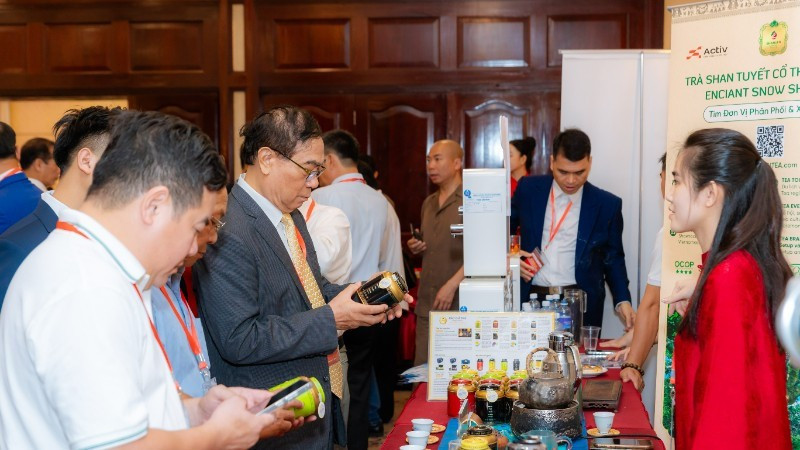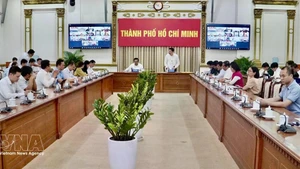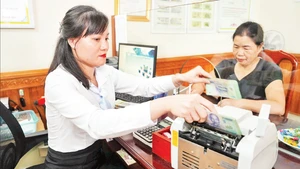Trade fraud hinders digital economic development process
In Viet Nam, trade fraud has grown increasingly complex, not only in traditional markets but also across e-commerce platforms, where thousands of online shops exploit social media and influencers to promote poor-quality goods.
According to the National Steering Committee 389, about 34,000 violations involving counterfeit goods and commercial fraud have been detected so far in 2025. These acts erode consumer trust, cause major losses for legitimate businesses, and lead to tax revenue shortfalls. It also ultimately distorts the domestic market, fosters unfair competition, and hinders digital economic development process.
In the context, building an effective coordination mechanism among the state, enterprises, and associations is essential to orient, manage, and develop e-commerce in a transparent, responsible, and sustainable manner.
Many studies have shown that an effective management model for digital media activities must be based on the principle of cooperation among the state, enterprises, and associations. This linkage model aims to build a transparent market that ensures fair competition and sustainable development. In this model, the state plays the leading role in orientation and regulation; issuing policies, laws, and standards; and monitoring mechanisms to ensure the openness and transparency of the market. The state also plays a coordinating role and promotes inter-sectoral cooperation, connecting with businesses and associations in sharing information, monitoring the market, and implementing advanced technological solutions such as AI, blockchain, QR codes, and RFID to trace product origins and detect counterfeit or substandard goods.
Enterprises are the central entities in the market. They are responsible for complying with the law, ensuring transparency in information, proactively preventing fraud, and protecting consumers’ rights. At the same time, they act as the direct executors, helping to spread professional ethics and business culture.
Associations serve as intermediaries and coordinators, linking the state and enterprises. They represent the collective voice of the business community, convey policy feedback, and carry out training, communication, technical support, and the establishment of professional codes of conduct for individuals and organisations participating in the digital ecosystem.
The smooth coordination among these three stakeholders not only enhances management efficiency but also creates a flexible self-regulatory mechanism, contributing to creating a transparent, responsible, and trustworthy business environment in the process of national digital transformation. Citing practical experience from other countries, Master Kieu Cong Thuoc, Chairman of the Board of Directors of the Innovative Start-up Fund Investment and Development Joint Stock Company (VNFund), said that in China, the management of influencers on social media is carried out with strict regulations on content and professional ethics, combined with strong penalties — even criminal prosecution — for serious violations. In the Republic of Korea, a socialised monitoring mechanism is applied, with professional associations and user communities participating in feedback, evaluation, and boycotting of unethical behaviour.
In Viet Nam, although the management of e-commerce activities has achieved many positive results, the formation and operation of the “State – Enterprise – Association” linkage model still face multifaceted challenges. According to Master Kieu Cong Thuoc, three major issues need to be clearly recognised. Fraudulent commercial practices are becoming increasingly sophisticated, combining digital technologies and consumer psychology, which is making it difficult for authorities to detect and handle them promptly; human resources and technical infrastructure of many functional agencies remain limited, while the development rate of digital platforms far exceeds the capacity of traditional supervision; and the legal framework and coordination mechanisms among the state, enterprises, and associations are still inconsistent, while many procedures overlap, and there is no unified mechanism for data and information sharing or for clearly defining responsibilities among parties.
Building a healthy, sustainable digital communication ecosystem
A close linkage among the state, enterprises, and associations is the fundamental solution to strengthening social trust, protecting the market, and promoting the healthy development of e-commerce. To achieve sustainable e-commerce development, Pham Minh Hieu, a technology expert on origin tracing TrueData, said it is essential to combine a legal framework, technology, and responsible social communication.
The “three-party” linkage model is based on the principles of co-governance, shared responsibility, and shared benefits, with the aim to build a transparent and sustainable development market with fair competitiveness. When “transparent technology – transparent market – transparent trust” is established, it will provide the foundation for e-commerce to develop.
According to Master Kieu Cong Thuoc, it is necessary to build a transparent communication culture, a “Trustworthy Influencer” programme, and a professional certification mechanism. Enterprises should take the initiative in controlling promotional content and ensuring contract transparency, while associations act as bridges for training and technical support. Facing emerging challenges, experts believe that four key groups of solutions should be implemented synchronously. First, the state needs to complete the legal framework, issue standards on professional ethics, advertising, and e-commerce, and at the same time, establish online channels for reporting and handling violations to improve management efficiency and policy responsiveness.
Enterprises must proactively build content control systems, ensure contract transparency with influencers, apply digital technologies to monitor disguised advertisements, and protect brand reputation.
Associations should promote their role as intermediaries by providing training, legal consultancy, technical assistance, and developing professional codes of conduct for online content creators.
Finally, it is necessary to strengthen community communication and international cooperation and learn from the experiences of advanced countries, thereby consolidating social trust and laying the foundation for a transparent, sustainable e-commerce market.
The “State – Enterprise – Association” linkage model in managing the activities of online influencers is an appropriate approach to ensuring a balance between development and control, and between creative freedom and social responsibility. Technology experts stated that to achieve efficiency, it is essential to improve laws on advertising and e-commerce; establish inter-sectoral coordination mechanisms among ministries, sectors, and professional associations; enhance the application of digital technologies (AI, blockchain) in content monitoring and fraud detection; and improve the professional competence and ethics of online influencers through training and professional certification programmes.
It can be seen that the synchronised coordination among the “three parties” not only helps manage risks but also contributes to building a healthy, sustainable digital communication ecosystem, strengthening social trust, and promoting the stable long-term development of Viet Nam’s digital economy.
















